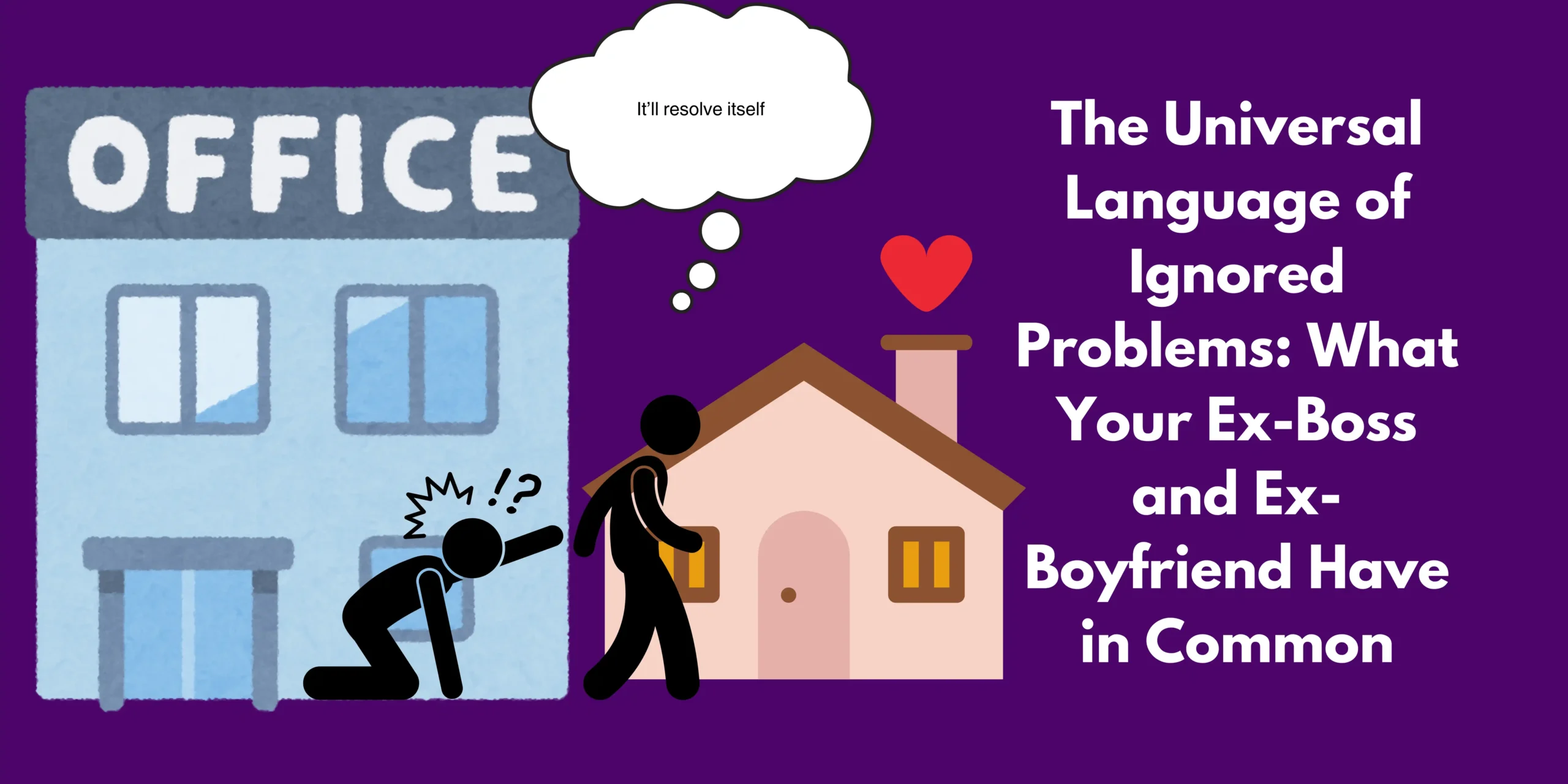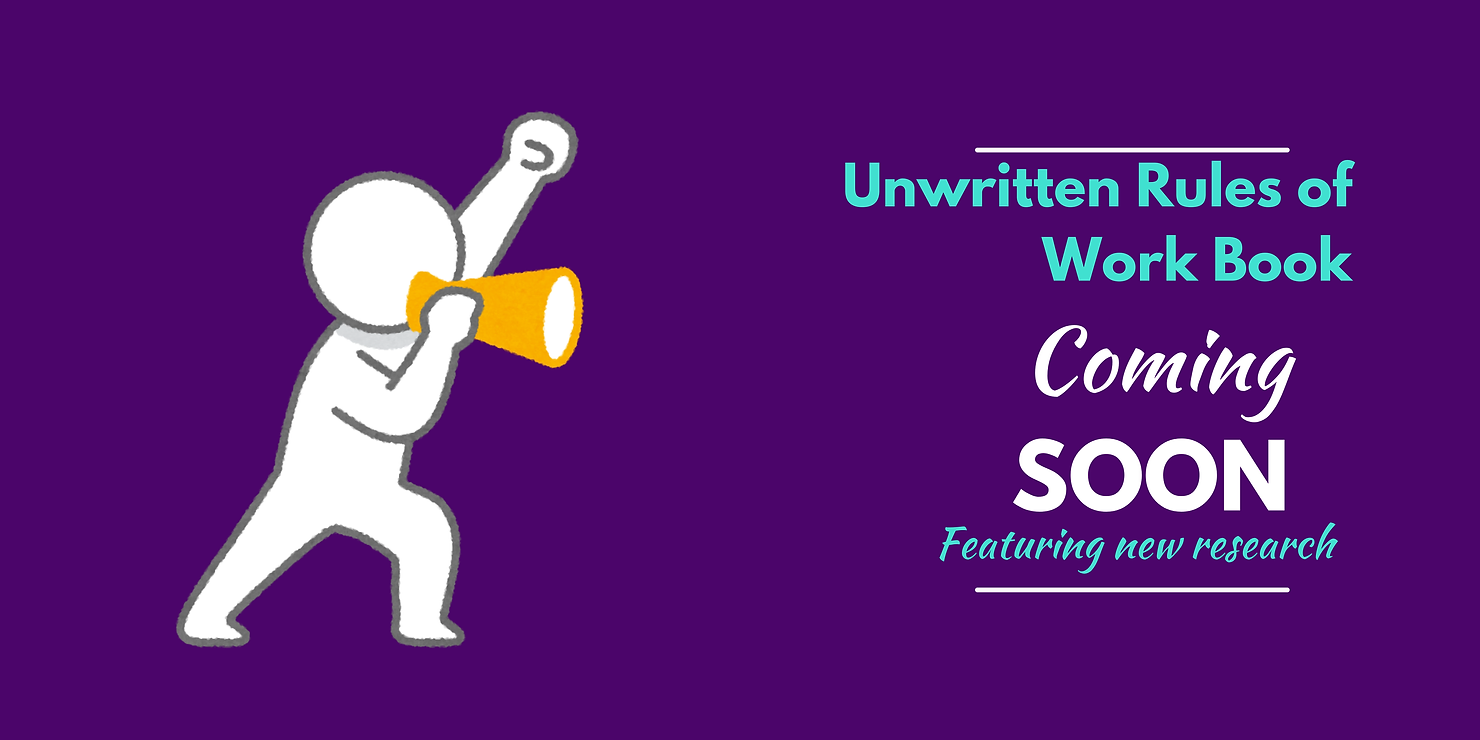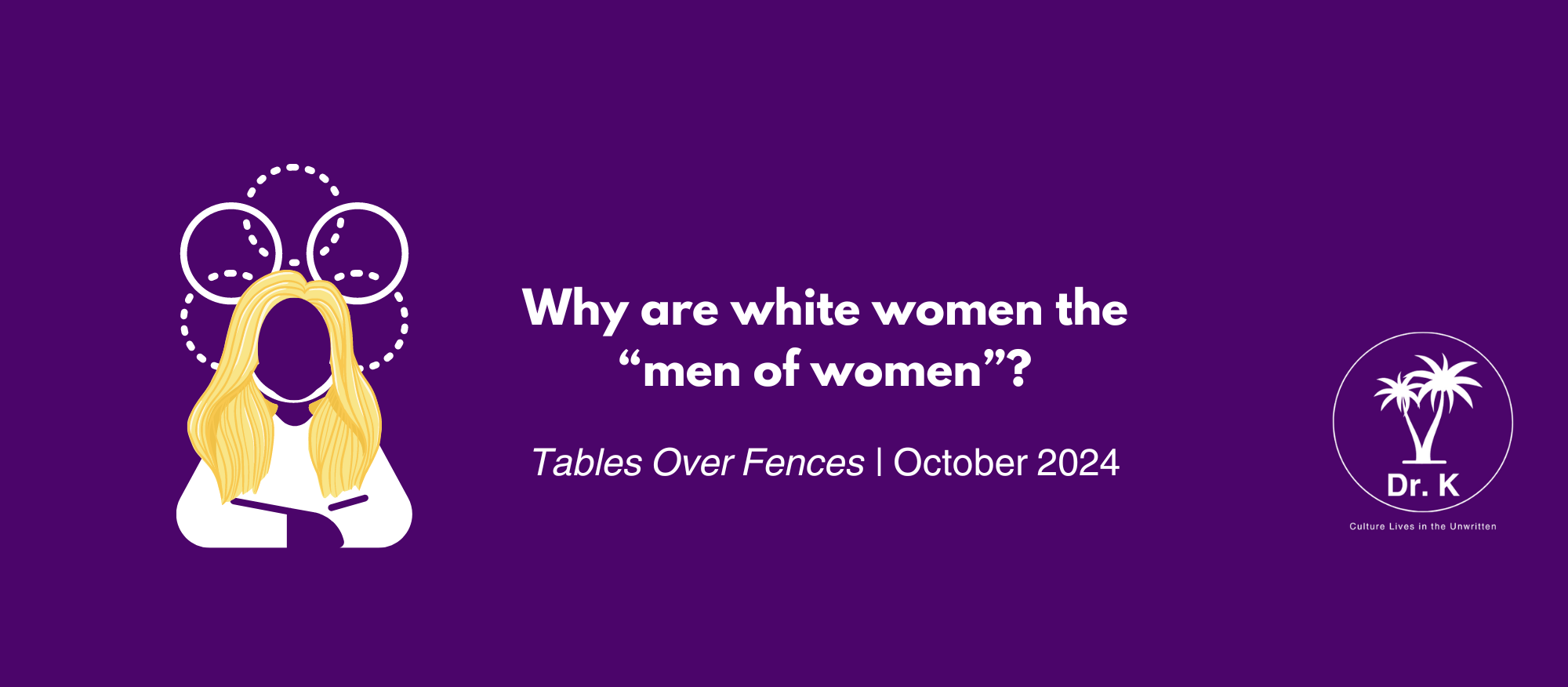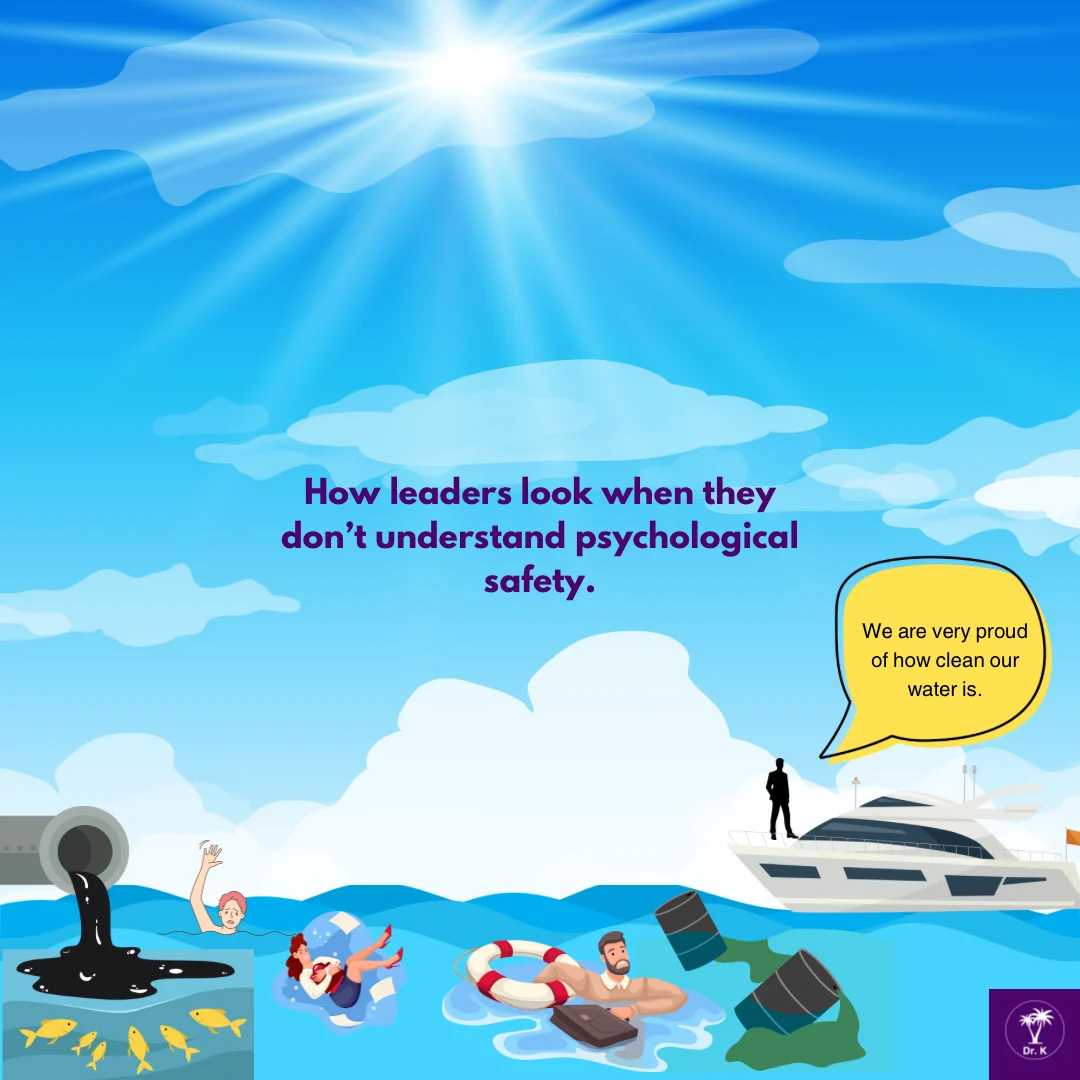The Universal Language of Ignored Problems: What Your Ex-Boss and Ex-Boyfriend Have in Common
1 year ago

“Why do leaders ignore issues, and then they’re shocked when the issues have consequences? Would you treat any other relationship in your life like that? If your partner brings up an issue, and you ignore it, you’re about to be single!”
I’ve delivered this line in my keynote address and received snickers from the audience. Yet now that I have a 16k+ social media following, I’ve received the type of feedback people are only willing to give behind a screen.
“Many men don’t realize they’re about to be single.”
And there’s some truth to that. According to experts at The Good Men Project, many men struggle with not knowing that their personal relationships are failing until it’s too late. One of the top 3 reasons? A lack of emotional fluency that has been culturally engrained in them since they were boys. This aligns with the empirical research demonstrating that while there are many reasons for divorce for both genders, a common reason for women in heterosexual relationships is that they are expected to do so much more emotional labor than men, which negatively impacts their psychological health. While unmarried men and women are equally likely to break up with each other, 70% of divorces in the US are initiated by women, even though it is more financially costly for women. While researching this phenomenon, I found online buzz about men being shocked when their wife asks for a divorce, while the wife feels like she has been battling for their marriage for years. Some propose that men are surprised because after years of fighting, the wife becomes silent. She’s tired. She realizes there’s no point, and she gives up. However, in this period of silence, the man thinks everything is okay. That she has accepted that he isn’t going to change and she’s fine with it. And then…she announces she is leaving.
I have never been married, but I can attest to having performed similar behavior in previous long-term, serious relationships.
“I got scared when you stopped arguing with me,” an ex said. “I realized you had given up on the relationship.” And he had accurately assessed that situation.
This experience is why it stands out to me when I see business leaders fall for this same pattern. The employees bring up a problem. They propose solutions. They ask for help. There are meetings where nothing happens afterward, surveys where people confidentially vent their frustrations and then no action is taken. And then…the employees grow silent. The company leaders think everything is okay. It’s all resolved itself. And then, the wave of turnover hits, your competitors get your top talent, and you end up spending an unnecessary amount of resources trying to recruit new talent, wondering why things aren’t running as smoothly as they were before, because you didn’t even realize how much the previous employees were doing. (And this is all best-case scenario, assuming they don’t hit you with a lawsuit and show documentation of all the issues you were aware of but did nothing to truly resolve them.)
Both of these scenarios, personal and professional, require emotional intelligence. Studies show that bosses who couldn’t spot an emotion if it danced naked in front of them wearing a sign that says “I’M AN EMOTION” tend to have employees with lower job satisfaction, lower team performance, and higher turnover rates. Color me surprised.
One study claims that emotional intelligence accounts for 90% of what separates effective leaders from their peers with just technical skills. Who would’ve thought that understanding your team’s needs and feelings might make you better at managing them? Mind. Blown.
So, what is emotional intelligence anyway? It’s not about being touchy-feely or crying at the drop of a hat. It’s about being smart with feelings – yours and everyone else’s. It’s like having a superpower that lets you read the room, manage your own emotional dumpster fires, and not completely botch your relationships. In other words, it’s what separates the adults from the toddlers in suits.
There are four components to emotional intelligence:
- Self-Awareness: This is all about knowing what’s going on in your own head. It’s like being your own personal stalker, but in a good way. Can you recognize when you’re about to blow a gasket? Do you know why that one coworker makes you want to scream into the void? If you answered yes, congrats! You’ve got a head start on self-awareness. If not, well, buckle up buttercup, you’ve got some introspection to do.
- Self-Management: Okay, so you’ve figured out what’s going on in your emotional circus. Now what? This is where self-management comes in. It’s about not letting your feelings turn you into a human wrecking ball. You know that urge to tell your boss exactly where they can shove that report? Self-management is what stops you from actually doing it. It’s like being the responsible adult to your inner toddler.
- Social Awareness: Remember that superpower I mentioned earlier about reading the room? This is it. Social awareness is like having emotional x-ray vision. It’s about picking up on the undercurrents in a conversation, noticing when your partner’s “I’m fine” actually means “I’m plotting your doom,” and generally not being oblivious to the emotional states of others.
- Relationship Management: Last but not least, we’ve got relationship management. This is where the rubber meets the road, folks. It’s about taking all that emotional intel you’ve gathered and actually doing something useful with it. Can you navigate conflicts without turning them into WWE smackdowns? Can you inspire and influence others without resorting to threats or interpretive dance? That’s relationship management in a nutshell.
Now, these four components aren’t separate little boxes you can tick off. They all work together, flowing and feeding into each other. You need self-awareness to manage yourself, social awareness to manage relationships, and so on.
Emotional intelligence isn’t just some fluffy buzzword cooked up by HR to torture you in your next performance review. It’s knowing yourself and others, and responding to each situation with what it requires (like Total Football in Ted Lasso…and if you haven’t watched Ted Lasso…please stop reading this and go let that beautiful work of art wash over you).
Because if you’re thinking, “Who cares about feelings? I’m here to make money, not friends,” boy, do I have news for you.
Imagine this: You’re the big boss, sitting in your corner office, pretending that the tension in your team is just everyone’s collective coffee jitters. You’re ignoring that culture problem faster than a teenager pretends not to see dirty dishes. Why? Because dealing with it requires emotional intelligence, and right now, your EQ is about as developed as a flip phone in the age of smartphones.
But here’s where it gets interesting. Flip the script to our personal lives, and what do we see? The same. Damn. Thing. The Gottman Institute, aka the relationship gurus, found that men often reject emotional intelligence because they fear losing power. However, when they embrace it, their relationship, sex life, and overall happiness are rewarded. It’s not about who forgot to take out the trash or who spent too much on a new gadget. It’s about feeling seen, heard, and understood. Sound familiar, workplace warriors? Whether you’re trying to nail that presentation or keep the spark alive in your relationship, being able to read the room (or the bedroom) is kind of a big deal.
But here’s the thing, pretending something isn’t happening doesn’t spare you from the consequences.
So, what are some of the consequences your ostrich impersonation?
- Productivity Nosedives: Your team starts working together about as well as cats and bathwater. Tasks that used to take hours now take days, because everyone’s too busy tiptoeing around the elephant in the room to actually get stuff done. And whether you’re paying them by the hour or salary, that’s costing you money.
- Innovation Becomes a Distant Memory: Remember those great ideas your team used to have? Yeah, those dry up faster than small talk at a mime convention. Nobody’s taking risks or sharing thoughts when the office feels like a psychological minefield.
- Your Best Talent Pulls a Houdini: Watch your top performers disappear quicker than free donuts in the break room. They’re not just leaving your company; they’re sprinting to your competitors, taking their skills, knowledge, and client relationships with them.
- Morale Goes Subterranean: Your office atmosphere turns so toxic it could qualify as a superfund site. Coming to work feels like a punishment, and your team’s enthusiasm flatlines harder than a bad EKG.
- Conflicts Escalate Faster Than a Twitter (X?) War: Without proper emotional guidance, small disagreements balloon into all-out office warfare. Suddenly, you’re spending more time playing referee than actually running your business.
- Your Reputation Plummets: Word gets out (because it always does) that your workplace is where careers and souls go to die. Good luck attracting new talent when your company’s Glassdoor reviews read like one-star Yelp ratings.
- The Bottom Line Bleeds Out: All of this chaos? It hits you where it really hurts – the wallet. Decreased productivity, high turnover, and a tarnished reputation start eating into your profits like termites on a wood buffet.
- Your Stress Levels Go Stratospheric: Congratulations! Your inability to address the problem has now made it YOUR problem. Your blood pressure’s through the roof, your sleep is a distant memory, and your work-life balance is as stable as a Jenga tower in an earthquake.
- Legal Issues Become Your New Hobby: Unaddressed culture problems have a funny way of turning into discrimination claims, harassment suits, and wrongful termination cases. Hope you like chatting with lawyers!
- Your Leadership Credibility Evaporates: Your team starts trusting your leadership about as much as they’d trust a wolf to babysit sheep. Your words become background noise, and your ability to guide the company effectively circles the drain.
So, what’s in it for you to develop that emotional intelligence and tackle culture problems head-on? Oh, just the small matter of your company’s success, your professional reputation, your mental health, and potentially your entire career.
Remember, ignoring a problem doesn’t make you look strong; it makes you look incompetent.
Strong leaders face challenges with their emotional intelligence dialed up to 11. Because at the end of the day, EQ isn’t just about feeling good – it’s about good business. And that, my friends, is a bottom line we can all get behind.
Now, let’s address the muscular, emotionally repressed elephant in the room. We live in a society that’s been telling certain groups (I’m looking at you, cisgender men) that emotions are weakness, that “real men don’t cry,” and that the only acceptable feelings are anger and… well, that’s pretty much it. Studies have identified that women demonstrate more emotional intelligence than men because culturally…we allow them to.
People born with y chromosomes aren’t inherently incapable of emotional intelligence. They are culturally conditioned to perceive it as weak because they are punished for developing these skills.
As we all know, women are drastically underrepresented in top leadership positions in well…everything (politics, corporate, etc.). And the numbers plummet even further when you see how many of those ladies aren’t as pale as I am. Western Civilization has been largely structured by wealthy white men, and over the past several decades, many countries have taken strides to implement more equalizing efforts at work and at home. Because ironically guess what? Even though many of the institutional pressures and cultures we feel today were designed by men, they’re not necessarily taking care of the dudes. A review of research on men and men’s health found that poor mental health is associated with poor physical health.
My first post for this blog described how culture wasn’t the iceberg, it’s the water. It’s the unwritten rules of how we are expected, punished, and rewarded to behave. Culture permeates everything and everywhere (work and home) because where there are people, there is culture. And unfortunately, most of us are swimming in some emotionally illiterate water, and it’s affecting everything from our board rooms to our living rooms. There’s an unwritten rule that nobody can show emotions at work, and consequently there is the unwritten consequence that we don’t know how to lead, collaborate, and problem solve.
It’s time we started seeing emotional intelligence for what it is – a crucial skill that can make or break our success in every area of life. It’s not just about being “nice” or “in touch with your feelings.” It’s about being effective, whether you’re climbing the corporate ladder or trying to keep your relationship from imploding.
So, let’s flip this script and reframe emotional intelligence in a way that would make even the most ardent subscribers to “Brohood Monthly” sit up and take notice.
Insert drum roll, clears throat . You see, ignoring issues is for amateurs. It’s like seeing a fire and deciding to just paint over the smoke damage. Real leaders, the kind who make history and inspire loyalty, they don’t just acknowledge problems – they tackle them with the precision of an emotional sniper and the strategic genius of a feelings military strategist.
So, let’s take all that emotional intelligence we’ve been pumping up and apply it to the battlefield of everyday issues. Whether you’re in the boardroom trenches or navigating the minefield of personal relationships, it’s time to stop playing emotional dodgeball and start addressing problems like the EQ-powered champions you are.
Think of it this way: every issue that comes up is a chance to flex those emotional intelligence muscles. It’s your opportunity to show that you’re not just talking the talk, but walking the walk. You’re not just emotionally intelligent – you’re emotionally invincible (how am I doing with the lingo bros?).
Remember, real strength isn’t about suppressing emotions or pretending they don’t exist. It’s about facing them head-on, understanding them, and using that knowledge to your advantage. It’s about being the Emotional Terminator – not an unfeeling machine, but a highly sophisticated badass who knows exactly how to navigate the human emotional landscape.
So the next time somebody brings up a problem at work (or at home), resist the urge to file that away into your emotionally incompetent drawer. Try some of the below strategies instead. Your organization (and your partner) will thank you.
(How’d I do fellas?)
Now, does this mean that all women leaders are emotionally intelligent? Of course not. Not all women are. And even if they are at home, many women might try to suppress it at work in order to “fit in” with their male executive peers, and to avoid the female stereotype of being “too emotional.” And there are absolutely men who are emotionally intelligent! However, when evidence shows there are cultural divides, it is on all of us to navigate how we can learn from each other.
People who are not men can support developing emotional intelligence, as we all benefit from it. I don’t want to put more emotional labor on us, since we’re already doing the brunt of it. Additionally, I want to acknowledge that men tend to seek the approval of other men over the approval of women, so men will have to support each other in this endeavor. However, because I believe in community, here are some actions we non-men can take to support the fellas:
- Retire harmful phrases:
- Encourage eliminating phrases like “man up,” “grow a pair,” or “boys don’t cry” that reinforce toxic behaviors, suppress emotional expression, and imply that men (and only men) can be tough.
- Recognize and reward emotional intelligence:
- In professional settings, highlight and praise examples of all individuals demonstrating good EQ, regardless of gender.
- In personal relationships, note your own biases when people show emotions. Question when you “get the ick.” Did he really do something wrong, or do you have an implicit bias against only one gender demonstrating emotions?
- Media representation
- Support and promote media that shows people of all genders expressing a full range of emotions healthily.
- (Have I mentioned Ted Lasso is a great watch? I promise you I have never seen my 78-year old white man father binge watch a show until then!)
- I also recommend Man Enough by Justin Baldoni, as a riveting, heart-wrenching, and evidence-based read.
- Take care of the little ones:
- Advocate for emotional intelligence education in schools, starting from a young age. Socio emotional skills are compounding, meaning the earlier they are learned, the more people are able to learn and progress in their development.
- If you have children in your life (regardless of gender), teach them it’s healthy to identify and express their feelings. This will help them become stronger, more effective leaders and better humans.
- Challenge traditional gender roles without demonizing any gender:
- Frame emotional intelligence as an expansion of human capability, not a gender role (see my goofy attempt above for a laugh, but seriously! What is “weak” about working through tough emotions? That is our body’s way of letting us know it’s time to take action!).
- Encourage everyone to seek professional help:
- Normalize therapy and counseling for all. If someone in your life is seeking support, do not mock them or “out” them. We can all benefit from making time to focus on self-improvement.
- Support paid parental leave:
- Advocate for policies that allow all genders to be more involved in caregiving, which can boost emotional intelligence and gender equity.
- Highlight the benefits:
- Spread the word on how emotional intelligence can improve everyone’s lives, relationships, and careers.
- Make sure you also check in on your guy friends emotionally, and not just your gal pals. The suicide rates for men are astronomical. This habit is lifesaving.
As we wrap up this emotional rollercoaster of a post, let’s remember that developing emotional intelligence isn’t just about personal growth—it’s about creating a more empathetic, effective, and harmonious world for everyone. Whether you’re a CEO, a team leader, or just trying to navigate your personal relationships, the ability to understand and manage emotions is your secret weapon.
So, the next time you’re tempted to ignore an issue, remember: sweeping problems under the rug is NOT going to spare you the consequences. I hope you enjoy many moments of peace and stillness in your personal and professional life. But I hope you also know the difference between a healthy relationship without chaos, and the silence that comes from a throat sore and tired of screaming and arguing, and is instead heading toward the door and costing both of you money and legal concerns.
More blogs
Book Retreat Hiatus
Book Retreat Hiatus Social Class 3 semanas ago When the universe is ready for you, it’ll knock you onto your […]
Why are white women the “men of women”?
Why are white women the “men of women”? Social Class 3 months ago Last month I talked about how economic […]
Is inequality really about social class, not race?
Is inequality really about social class, not race? Social Class 3 semanas ago Class has been at the center of […]
The Universal Language of Ignored Problems: What Your Ex-Boss and Ex-Boyfriend Have in Common
The Universal Language of Ignored Problems: What Your Ex-Boss and Ex-Boyfriend Have in Common Social Class 5 hours ago “Why […]
Tips for Navigating Polarization at Work – From Independence Day to Election Day
Tips for Navigating Polarization at Work – From Independence Day to Election Day Social Class 5 hours ago Growing up, […]
Unlearning Homophobia, Learning Inclusion: A Leader’s Journey Toward a More Equitable Workplace
Unlearning Homophobia, Learning Inclusion: A Leader’s Journey Toward a More Equitable Workplace Social Class 5 hours ago It’s Pride Month, […]
How AI Can Help You Be a More Culturally-Competent Leader
How AI Can Help You Be a More Culturally-Competent Leader Social Class 3 months ago “If you walked into an […]
Is AI Going to Close Our Gender Gaps?
Is AI Going to Close Our Gender Gaps? Social Class 5 hours ago Recently, I was having lunch with a […]
Why We Won’t Have Psychological Safety Until We Understand Courage
Why We Won’t Have Psychological Safety Until We Understand Courage Social Class 5 hours ago Have you ever seen/heard an […]








